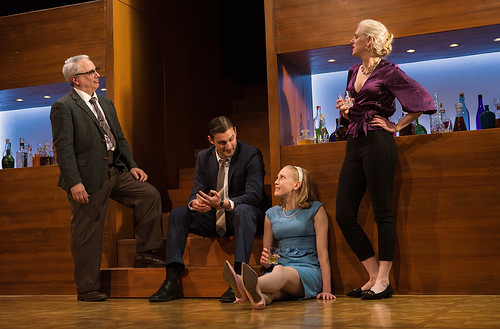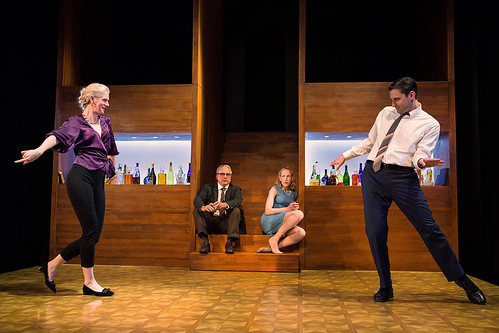Bouncy around here: Shotgun's Virginia Woolf howls
 The quartet in Shotgun Players' Who's Afraid of Virginia Woolf? includes, from left, David Sinaiko as George, Josh Schell as Nick, Megan Trout as Honey and Beth Wilmurt as Martha. Below: Martha and Nick get their groove on, while Honey and George watch from the sidelines. Photos by Jessica Palopoli
The quartet in Shotgun Players' Who's Afraid of Virginia Woolf? includes, from left, David Sinaiko as George, Josh Schell as Nick, Megan Trout as Honey and Beth Wilmurt as Martha. Below: Martha and Nick get their groove on, while Honey and George watch from the sidelines. Photos by Jessica Palopoli
Edward Albee's Who's Afraid of Virginia Woolf? is famous for being, among other things, a night in the life of a querulous quartet, a four-part marital slugfest, a boozy broadside in four parts. In other words, four actors fighting, lashing out, drinking and suffering. All of that is present and accounted for in director Mark Jackson's production concluding Shotgun Players' 25th anniversary season. But it feels like there's another character here.
In the center ring, the boxing ring that is, we have George and Martha – the associate professor of history and the daughter of the college president – who make their detestation of life (and, consequently, each other) a contact sport. Jackson's set designer, Nina Ball, helps him remove the play from reality (it's all an illusion anyway) by creating a home without furniture. There's a big parquet wood floor, a central staircase leading to a second level and, most prominently, two backlit built-in bars filled with an assortment of bottles.
The vast emptiness is, literally and figuratively, a stage on which George and Martha enact their drama for a late-night audience of two, new arrivals to the college Nick (a biology professor) and his wife, Honey. Once they arrive, that empty stage becomes more of a boxing ring, which is referred two several times in the play (there's even a story about Martha punching George in front of her father). The void also creates additional tension – Albee's script supplies plenty of its own – because none of the characters can sit comfortably. They have set on the edge of the stage, on the stairs or on the floor. The areas to the side of the stage become littered with coats, purses, shoes, broken glass and lots of empty cocktail vessels.
Even though we know how this Woolf works – Albee's 1962 play, famously denied the Pulitzer by the very committee that awarded it, is familiar from the shrill movie and countless productions over the last 54 years – it's both comforting and shocking to feel the oomph of the verbal sparring and to revel in the nastiness of impolite behavior by people who know better. Lines like "I swear if you existed I'd divorce you" or "My arm has got tired whipping you" are timeless because they're just that mean. And the way the younger couple gets sucked into the older couple's vortex is so fascinating it's practically scientific. Why don't they just leave? They can't! They're caught in an irreversible gravitational pull and the solar system is about to implode!
So amid the familiarity of well-loved/feared play, the ever-intelligent and adventurous Jackson shakes things up. First thing you notice is that set (well lit by Heather Basarab) and all that space. Then comes that presence, something so potent it becomes like a fifth member of the party: Dave Brubeck's "Take Five." Piano vamp, unforgettable sax melody, colossal drum solo – it's a familiar tune that takes on sinister proportions here used both as underscore and as a song that the characters are actually playing on the old record player. At one point, and I could have imagined this, it seemed like the characters were speaking in rhythm with the music, like Albee's dialogue was jazz itself. Thrilling. The drum solo also pops in not unlike Antonio Sanchez's drum score in the movie Birdman. Brubeck is replaced by more generic white noise horror movie sound in the third act, which isn't as effective, but chances are good that for audience members, "Take Five" will trigger memories of this Woolf.
At more than three hours, this is a lot of play. But Jackson's inventiveness and his sturdy quartet of actors ensure an evening that never lags. Beth Wilmurt and David Sinaiko are Martha and George, a couple whose aggression and passive aggression know no bounds. Wilmurt's Martha shows some vulnerability underneath the gizzard-slicing wit and smart cruelty. She has the most unconvincing laugh ever heard – every time she laughs it sounds almost painful for her – and when she decides to be a sexual predator, she leaves no doubt that she could accomplish whatever she wants.
Sinaiko's George hardly seems the victim here. He may be Martha's punching bag, but he gives as good as he gets, and seems to take special delight in getting the guests, to paraphrase the name of one of his party games. Josh Schell and Megan Trout as Nick and Honey, the George and Martha in training, work hard to avoid caricature, and while Trout conjures images of an uptight Madeline Kahn in What's Up Doc?, Schell effectively creates a more complex man than the straight white product-of-the-'50s jock that Nick seems to be.
The emotional intensity of the performances doesn't always reach Albee's maximum levels, but it's all here, the train wreck, schadenfreude, hurt me some more, pour me another, please love me mind fuck that is Who's Afraid of Virginia Woolf?.
Rest in peace, Mr. Albee.
FOR MORE INFORMATIONEdward Albee's Who's Afraid of Virginia Woolf? continues through Nov. 20 in its initial run then continues in repertory Nov. 27 through Jan. 22. Tickets are $25-$40. Call 510-841-6500 or visit www.shotgunplayers.org.
